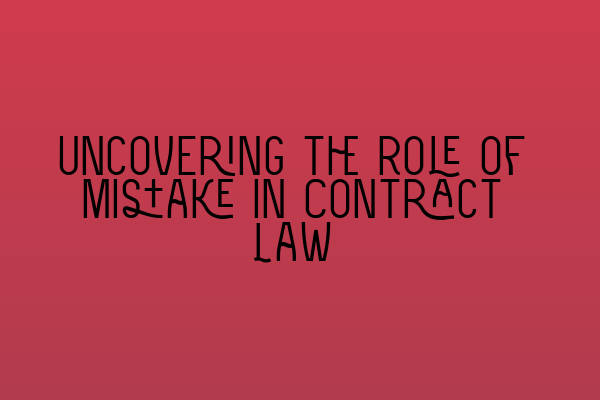When it comes to contract law, the concept of mistake plays a significant role in determining the validity and enforceability of an agreement. Mistakes can occur on various levels, ranging from mutual mistakes made by both parties to unilateral mistakes made by one party. Understanding the different types of mistakes and their implications is crucial for both solicitors and individuals involved in contractual negotiations.
The Importance of Identifying Mistakes
In contract law, a mistake refers to an erroneous belief held by one or both parties at the time the contract was formed. This erroneous belief can be about a fact or a matter of law and may impact the intentions and understanding of the parties involved. Identifying and addressing mistakes in a contract is vital to ensure fairness, justice, and the overall integrity of the legal system.
One common type of mistake is a mutual mistake, where both parties are mistaken about a fundamental aspect of the contract. This could include a mistaken understanding of the subject matter, the terms, or any other essential element. In such cases, the contract may be voidable, allowing the affected party to seek legal remedies or request rescission of the agreement.
On the other hand, a unilateral mistake occurs when only one party is mistaken about a fundamental aspect of the contract, and the other party is aware of the mistake. In such instances, the courts may consider whether the non-mistaken party took advantage of the mistake, leading to potential issues of unfairness or unconscionability.
Resolving Mistakes in Contract Law
When a mistake is identified in a contract, various legal principles come into play to determine the appropriate course of action. One such principle is the doctrine of mistake, which aims to rectify unfair outcomes caused by mistaken beliefs.
For a contract to be voidable due to a mutual mistake, certain conditions must be met. First, the mistake must be about a basic assumption that goes to the core of the contract. Second, the mistake must have a material effect on the agreed-upon terms. Finally, the party seeking to void the contract must not have assumed the risk of the mistake.
Similarly, in cases of unilateral mistake, the courts consider additional factors for an agreement to be voidable. These include whether the non-mistaken party knew or should have known about the mistake, and whether enforcing the contract would lead to unjust enrichment, oppression, or unconscionability.
Case Examples and Precedents
Several landmark cases have shaped the role of mistake in contract law over the years. An important example is the case of Smith v. Hughes (1871) where the courts held that a contract can still be binding if the parties have different subjective understandings, as long as their objective intentions align.
On the other hand, in Great Peace Shipping Ltd v. Tsavliris Salvage (International) Ltd (2002), the House of Lords considered the issue of unilateral mistake. The courts held that a mistake made by one party does not automatically render the contract voidable; the mistake must be so serious that enforcing the contract would be unjust or unconscionable.
Conclusion
Mistakes play a significant role in contract law, and understanding their implications is crucial for solicitors and individuals in contractual agreements. Whether it be mutual mistakes or unilateral mistakes, identifying and resolving these errors is essential to maintain fairness, justice, and the overall integrity of the legal system.
If you’re interested in further exploring the intricacies of contract law and preparing for the SQE exams, be sure to check out our related articles:
